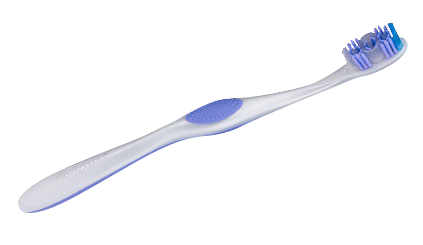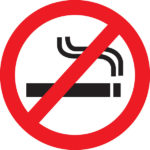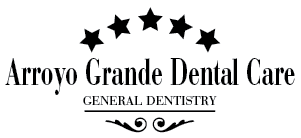Brushing

The ADA recommends changing your toothbrush every 3-4 months, so make a resolution to change your toothbrush with every season this year. Frayed and broken bristles won’t keep your teeth clean—these are signs it’s time to let go. When you’re shopping, look for one with the ADA Seal of Acceptance.
Floss Daily

The American Dental Association recommends cleaning between your teeth daily with an interdental cleaner (like floss). Cleaning between your teeth may help prevent cavities and gum disease. Cleaning between your teeth helps remove a sticky film called plaque. Plaque contains bacteria that feeds on leftover food or sugar in your mouth. When that happens, it releases an acid that can eat away at the outer shell of your teeth and cause cavities.
Plaque that is not removed by brushing and cleaning between your teeth can eventually harden into a rough substance called tartar (or calculus). Tartar collects along your gum line and can lead to gum disease. Once tartar forms, only your dentist can remove it.
Don’t Smoke

The number one influencing factor that has been shown time and time again in periodontal disease is smoking. Smokers are five times more likely to have periodontal disease than non-smokers. Smoking constricts the blood vessels in the mouth and slows down the healing process and decreases the antibodies that are produced, creating an environment that is more prone to disease. In addition, it has been found that smoking decreases the available Vitamin C to the body. Vitamin C has been shown in hundreds of studies to help with healing, improve the strength of the blood vessel walls and is a powerful anti-oxidant which helps to reduce the aging of cells.
Drink Water

The human body contains plenty of water, however, we are continually losing water through sweat, urine, tears, and even in our breathing. Most authorities recommend drinking at least 2 quarts – that’s eight glasses of water per day. Water is necessary for helping to transport nutrients throughout our body, as well as remove the waste products. In addition, it helps lubricate our joints and regulate our body temperature. Be careful about thinking that because you may drink sodas or coffee, that you are getting your daily supply of water. In fact, the caffeine in coffee, tea and soft drinks, as well as (the alcohol in) alcoholic drinks act as diuretics and cause the body to LOSE water. Water helps keep your skin supple and soft.
Eat Well

Eat a good balanced diet that contains a good mix of meats as well as vegetables and fruits with a minimum of sugary snacks, soft drinks and coffee. We have found through simple surveys of our patients, that the people with the least number of cavities tend to rarely drink sodas and intake minimal coffee, sugary snacks and drink a lot of water. This contributes to having a higher salivary pH, making the body healthier and less likely for bacteria to cause damage.
You should strive to eat at least five servings of fruits and/or vegetables daily, as well as 30 minutes of cardiovascular training five days a week for optimum health.
Taking some type of vitamin supplement that is appropriate for your age and gender, may also be a good idea. It is always best to consult your physician prior to taking any medication or supplement.
Reduce Stress

This is another factor that can contribute to dental related problems such as clenching or grinding. A couple of simple tips to help reduce this is to cut down on consuming alcoholic beverages, try to relax before you go to bed by doing some simple things such as a warm bath, talking with a friend, reading, or meditation. If you do clench your teeth, it can cause headaches and wearing on the teeth. By wearing a nightguard to prevent that grinding, some people are able to reduce their stress as well as radically reduce the headaches.
